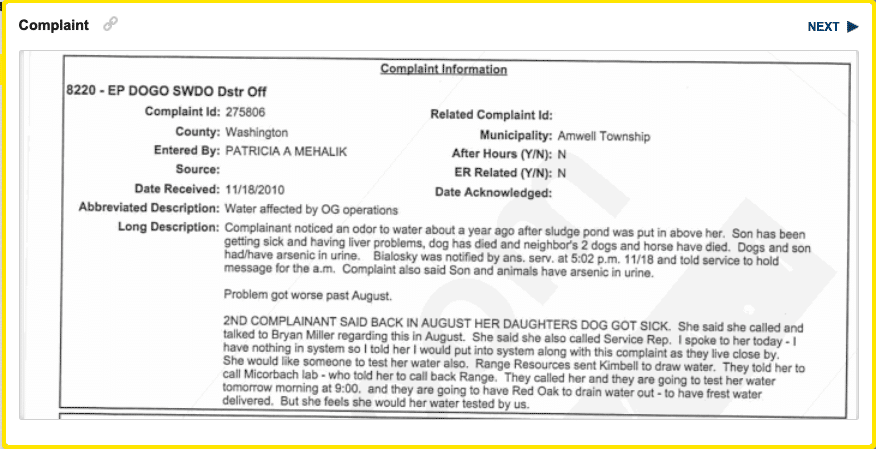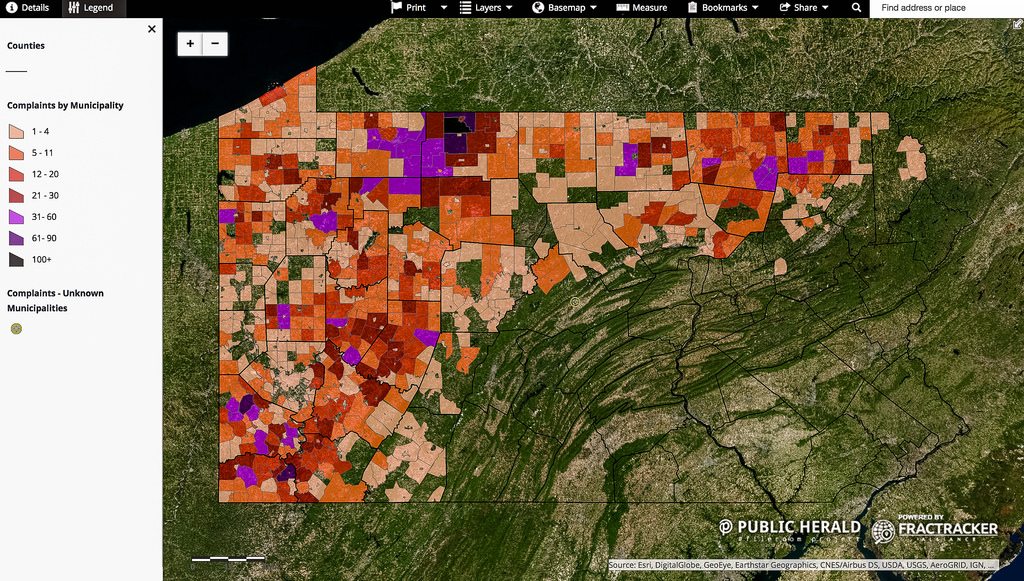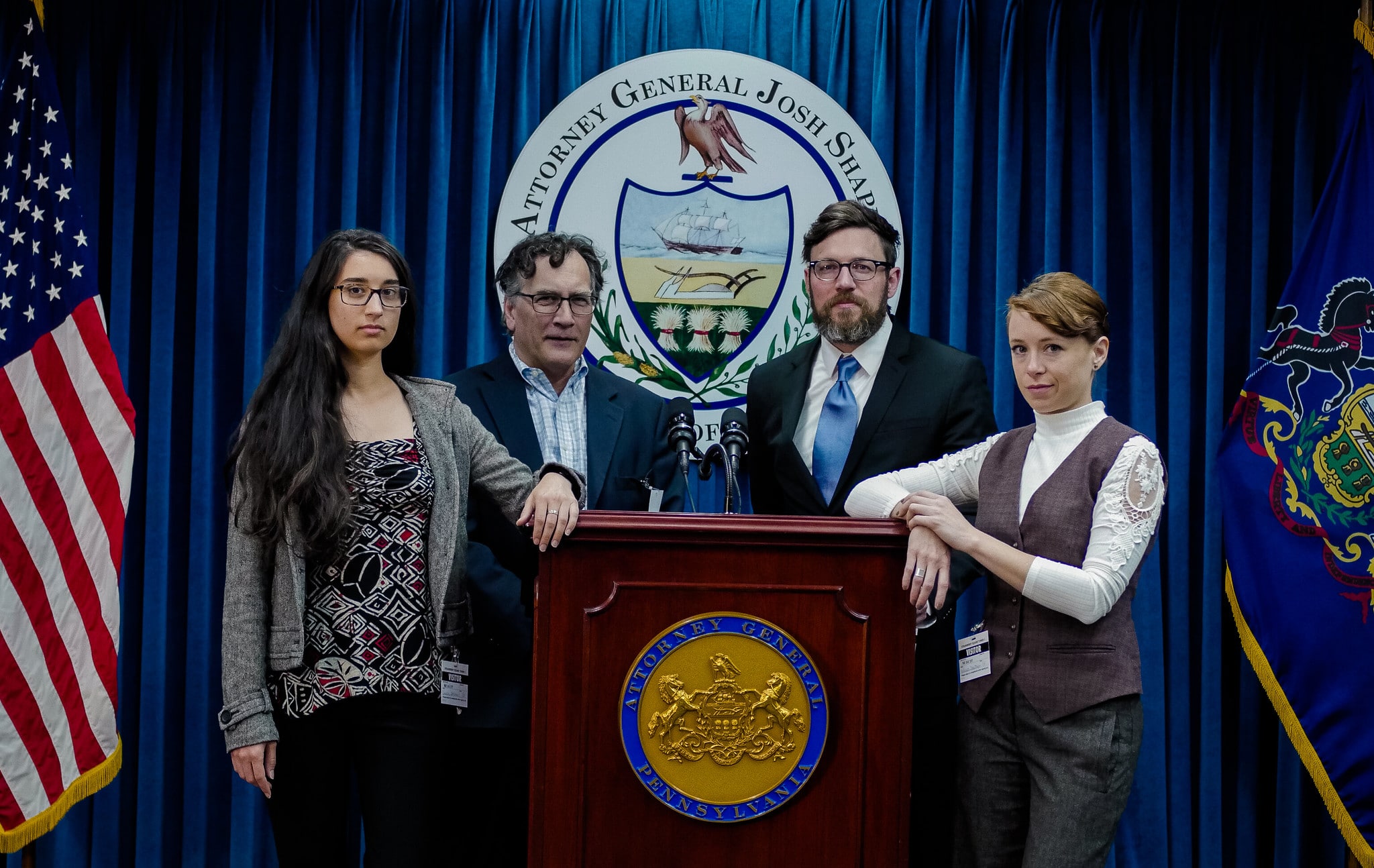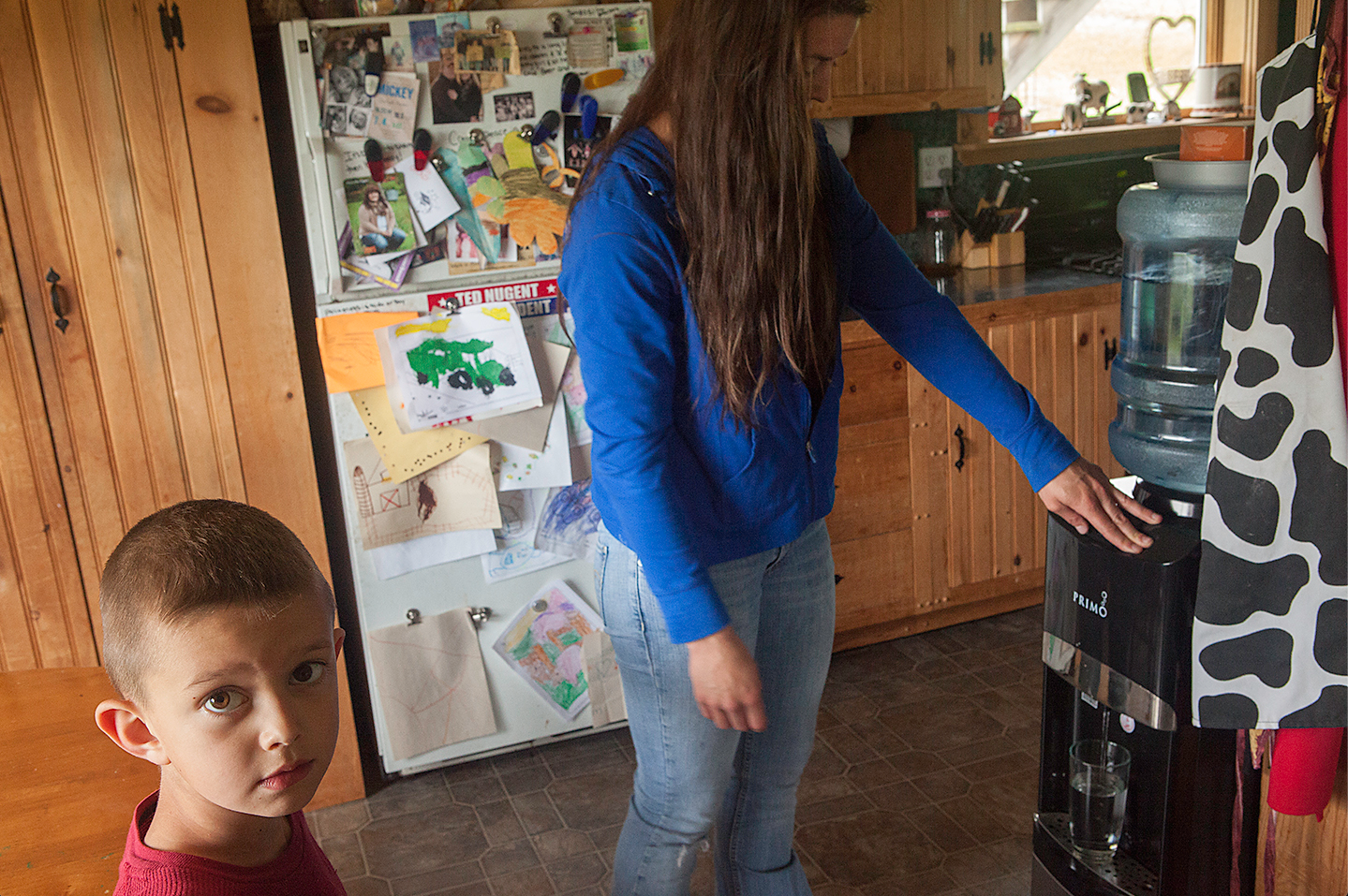Officials Told Families Their Water Was Safe After Fracking, Now A Grand Jury Says Crimes Were Committed
Water being independently tested by Mark Ruffalo’s Water Defense team at the home of Christine Pepper on Southside Road in Leroy Township, Bradford County, Pennsylvania. Christine (in blue) is seen with her two sons, and her mother Carolyn Knapp. The results found high levels of acetone, a fracking related chemical DEP claimed was only a lab contaminant. Their story appeared on The Daily Show w/ John Stewart after a Public Herald investigation about DEP’s mishandling of the Pepper family’s water complaint. © Steven Rubin for Public Herald.
Watch newsCOUP This Wednesday, July 1st at 8:00 PM EDT for a special live broadcast about the Attorney General’s charges, Public Herald’s investigation, and the criminals at DEP who remain at large.
SUBSCRIBE » | YouTube |
Officials Told Families Their Water Was Safe After Fracking, Now A Grand Jury Says Crimes Were Committed
by Kristen Locy and Joshua B. Pribanic for Public Herald, edited by Melissa Troutman
June 29, 2020 | Project: SMOKING GUN | Broadcast: newsCOUP
This story covers 9 years of Public Herald investigations into drinking water complaints. See the INVISIBLE HAND page for a complete overview of our coverage. We will continue to update this story as we learn more from the AG and sources involved.
On November 18, 2010, a family reported a cry for help to the Pennsylvania Department of Environmental Protection (DEP) when their teenage son turned sick and began to experience liver problems after an oil and gas waste sludge pond was installed above their home in Amwell Township, Pennsylvania. The pond, owned by fracking company Range Resources, was also blamed for animal deaths in the complaint. A “dog has died, and neighbor’s 2 dogs and the horse has died. Dogs and son have been found to have arsenic in urine,” the complaint recorded.*
Five days later, DEP mailed a letter to the family with their conclusion, “Sample results do not indicate that there was any impact to the well water from gas drilling operations.”
On Friday, June 12th, 2020, 10 years after DEP’s decision, Pennsylvania Attorney General Josh Shapiro announced that a Grand Jury has charged Range Resources with seven counts of environmental crimes at the site of these complaints — the Yeager and Brownlee Sites in Amwell Township, Washington County — for releasing toxic oil and gas pollution to waters of the Commonwealth.** Attorney General Shapiro declared this is only the beginning of a series of oil and gas crimes to be revealed in the coming weeks.
A second announcement by the Attorney General on Monday, June 15th charged Cabot Oil & Gas with criminal conduct for contaminating drinking water in Dimock Township, Susquehanna County.***
Dimock is a community made famous for ignitable drinking water after unconventional drilling or “fracking” began in the area. When fracking kicked off in 2006, Dimock residents started complaining to DEP about changes in their well water, including: effervescence, muddy color and foul taste.
These fracking stories about drinking water complaints have been told and retold by news organizations across the globe. Stories like, in 2009, when Norma Fiorentino’s water well exploded in Dimock after methane reached combustible levels in her drinking water.
Since 2004, Public Herald uncovered residents have complained to DEP over 10,000 times about more than just water quality changes.
This map shows the density of citizen complaints reported to the PA Department of Environmental Protection’s Oil and Gas Offices from 2004 – 2016. The widespread dispersal of complaints matches the shape of the Marcellus Shale formation in Pennsylvania. Clicking a township reveals a database of complaints where viewers can view or download files. The full report can be read at publicherald.org/fracking. © Public Herald
Once again, the stories are being retold, this time by Pennsylvania’s Attorney General Josh Shapiro. But so far, Shapiro hasn’t charged the main antagonists, the Pennsylvania DEP and their Deputy Secretary of Oil and Gas, Scott Perry, for committing acts of official misconduct uncovered by Public Herald in 2017.
In May 2017, Public Herald shared 178 cases with Attorney General Josh Shapiro’s office where Regulators were complicit in environmental crimes by botching investigations in seemingly willful ways, forcing families to live with contaminated water for years with no recourse.****
In these cases, DEP ignored health complaints, altered water test results, refused to inspect problems, and manipulated the laws that govern those agencies to the benefit of the industry. The DEP even denied children clean water when the law dictated it should be provided.
Public Herald’s Joshua Pribanic (middle right), Melissa Troutman (right), Sierra Shamer (left), and science advisory board member Dr. John Stolz (middle left) met with Attorney General Josh Shapiro’s agents in May 2017 to share evidence from their three-year report that uncovered environmental crimes and official misconduct during DEP complaints. © Joshua Pribanic for Public Herald
On Thursday, June 25, 2020, the 43rd Statewide Grand Jury released a 235-page report that told the truth about DEP’s relationship with fracking and the Department of Health’s distance from the issue. The Grand Jury determined what Pennsylvanians across the shale fields have been lamenting for over a decade: “Pennsylvania failed to protect citizens during the fracking boom.”
The Grand Jury’s findings cut down thousands of false-narratives by industry advocates, and regulators, that the air and water of these Pennsylvania residents was “safe.”
Christine Pepper and her son at their home in Leroy Township, Bradford County, Pennsylvania. The family was forced to live with water suspected to be contaminated with chemicals from fracking after DEP manipulated the law and refused to return and test their water supply. © Steven Rubin for Public Herald.
What Needs to Happen for the DOH to Take Action on Fracking?
Following the Grand Jury’s Report, Public Herald has released the top 50 health complaints discovered during our investigation of DEP. They include tales of nausea, rashes, blurred vision, deaths, and “passing blood” after using drinking water.
If someone calls the DEP with a health complaint that’s linked to drinking water, DOH officials are claiming they’re “told” they have to call the Department of Health (DOH). In the 50 complaint reports where Public Herald found explicit health problems, there’s no instance of DEP forwarding a single complaint to the DOH or telling the complainant to make the call. After reviewing more than 1000 oil and gas complaints from 2004-2016, Public Herald never found a record of the DEP and the DOH communicating about health problems related to oil and gas..
The DOH claims, in response to the Grand Jury Report, that they’ve advertised effectively to the public about how to contact the agency with health-related problems associated with fracking. But the Grand Jury Report dismisses these claims, saying the agency has gone no further than DEP, and that both are guilty of failing to alert the public about the dangers from oil and gas drilling.
Dr. Rachel Levine, the current Secretary of Health for Pennsylvania, has taken the position that the Department of Health cannot respond or take action on impacts from oil and gas until they confirm the health impacts are linked to oil and gas activities. They estimate it would take hundreds of complaints to their office to warrant a statewide response.
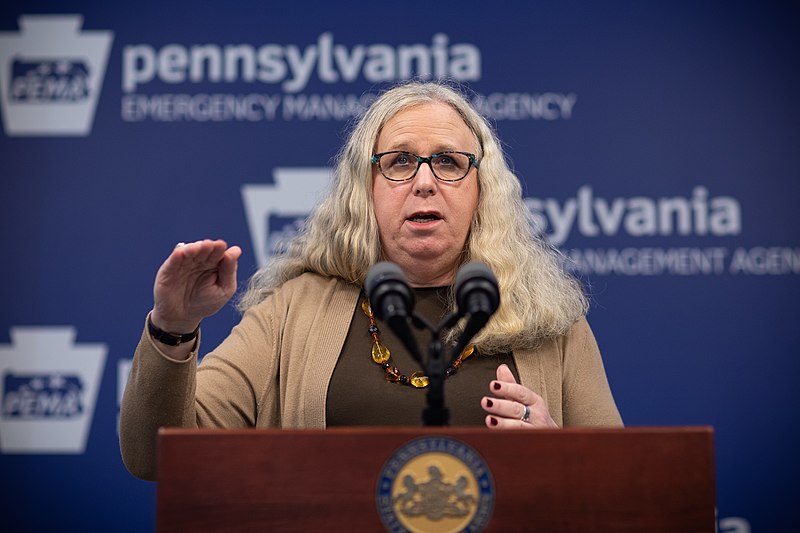
Secretary of Health Dr. Rachel Levine speaking at the virtual press conference. ©
Author Governor Tom Wolf from Harrisburg, PA
But this doesn’t mean that a total of hundreds of general health symptoms will get the DOH to act. The DOH expects they would need hundreds of individual symptoms, as in hundreds of nosebleeds or hundreds of deaths, hundreds of individual rashes or blurred visions in order to qualify a pattern of complaints to send to a DOH toxicologist to analyze. Once hundreds of one symptom were catalogued, the DOH would make a public statement to say, for instance, “don’t play in that stream” because it may have toxins or radioactive waste connected to oil and gas.
People who were sick would have to start calling the DOH hotline 717-787-3350, or email [email protected], for the DOH to respond.
In November 2019, Governor Tom Wolf and the DOH did declare to families demanding action about a cancer cluster in Washington County, Pennsylvania that answers about oil and gas health impacts would be coming soon. Gov. Wolf and the DOH announced the state would undertake a multi-million dollar health study to discover why children in the region were being diagnosed with rare cancers.
The Grand Jury’s report pointed to what scientists, Pennsylvania residents, the Auditor General, activists, attorneys, and the Public Herald have been saying for years — DEP is ignoring public health and engaged in systemic official misconduct. And the DOH, even with the announcement of a new study, is not far behind.
But the final and most serious story remains to be told by Attorney General Josh Shapiro — i.e. DEP crimes.

The Attorney General’s office setup a new hotline and email for residents to call in any related environmental or official crimes as a result of fracking or state investigations.
Footnotes:
* In the complaint the family said they had called DEP four months prior when their daughter’s dog got sick, but DEP never logged their complaint into the system.
** Range pleaded “no contest” in the case and was fined $150,000 for violating PA’s constitutional right to clean water, the Clean Stream Laws, and the Solid Waste Management Act. One-hundred thousand dollars of these fines are slated for “charitable contributions” to the Washington County Watershed Alliance – an “umbrella organization” for other Washington County watershed non-profits. Range Resources did not plead “guilty.”
*** According to Attorney General Josh Shapiro, “Today we have filed those criminal charges against Cabot oil and gas for their faulty gas wells that have allowed methane to continue to flow into the groundwater that serves as drinking water for a number of residents of Dimock, Auburn and Harford townships in Susquehanna County we have charged them with felony and misdemeanor violations of the Clean Streams Law; seven counts of prohibition against discharge of industrial wastes; seven counts of prohibition against other pollutions; and one count of unlawful conduct for knowingly failing to comply with the orders from DEP.” Cabot Oil and Gas is described as having “long term indifference to the damage it caused to the environment and citizens of Susquehanna County.”
**** In the Attorney General investigation it was reported that between 2011 and 2017 DEP issued 25 violations to Cabot Oil and Gas for various Dimock Township wells for polluting groundwater and waters of the Commonwealth including 78a.73(b).: “operator failed to prevent gas, oil, brine, completion and servicing fluids, and any other fluids or materials from below the casing seat from entering fresh groundwater, and shall otherwise prevent pollution or diminution of fresh groundwater.” Yet, Cabot Oil and Gas continued their drilling operations that entire time. The Attorney General revealed that as of June 2018, these violations remained outstanding.
***
Do you have thoughts about the fracking criminal investigation? Join the newsCOUP LIVE BROADCAST: Wednesday, July 1st, 2020 at 8:00 PM to talk about the Attorney General’s charges, Public Herald’s investigation, and the criminals at DEP who remain at large.
This program is hosted by Public Herald co-founders Joshua B. Pribanic and Melissa A. Troutman. Subscribe on YouTube to save your seats!
